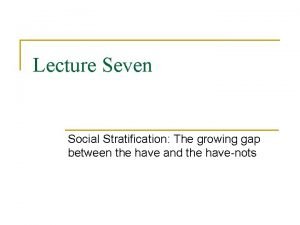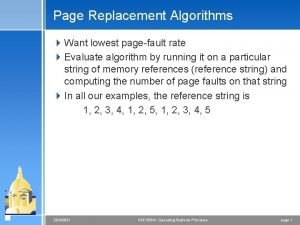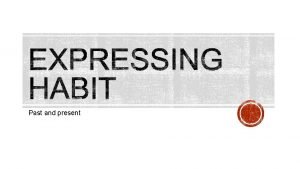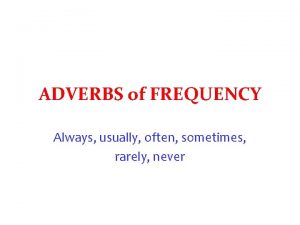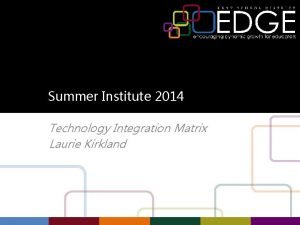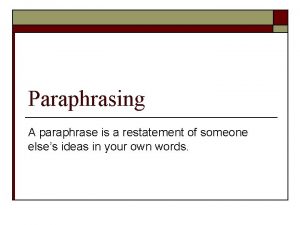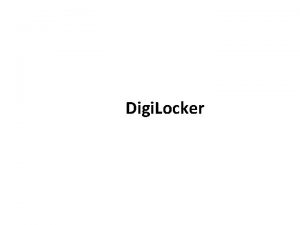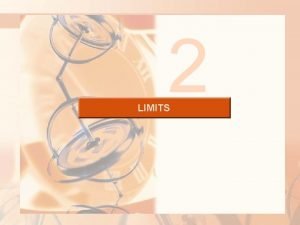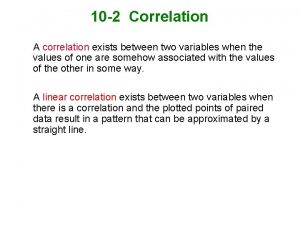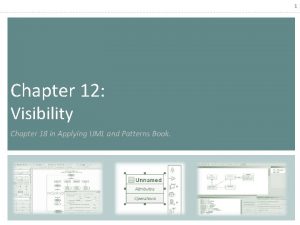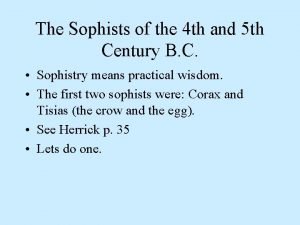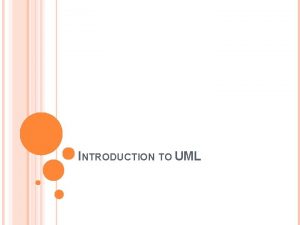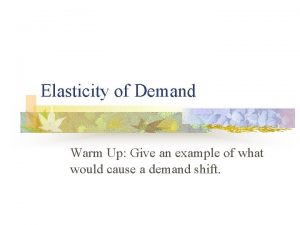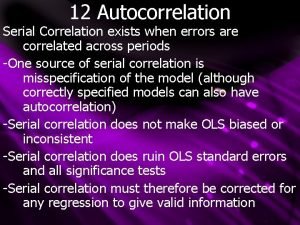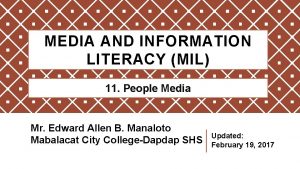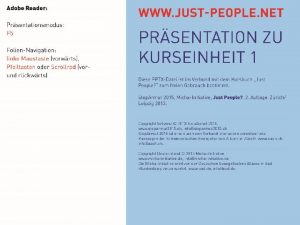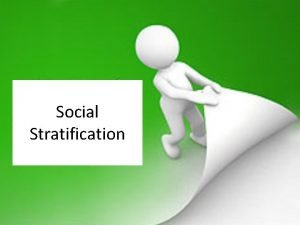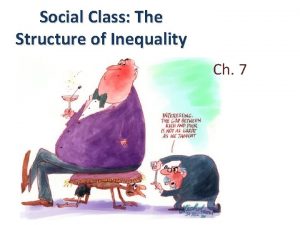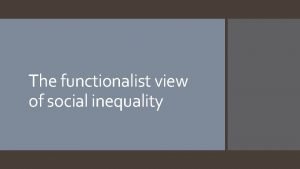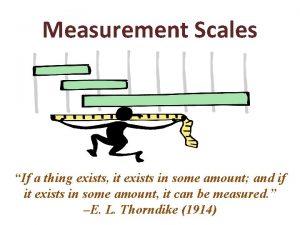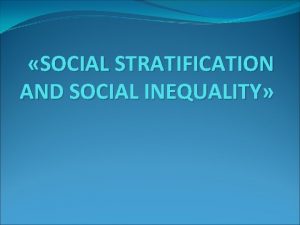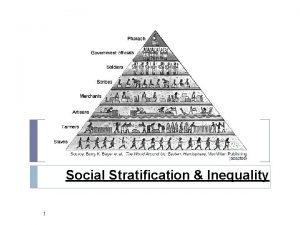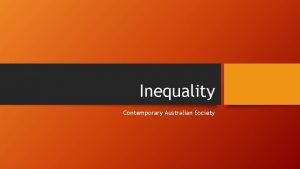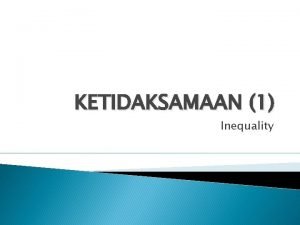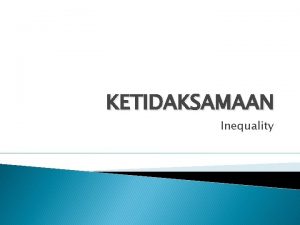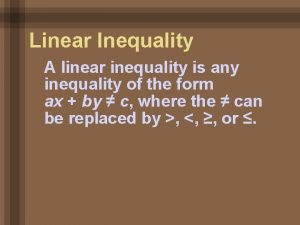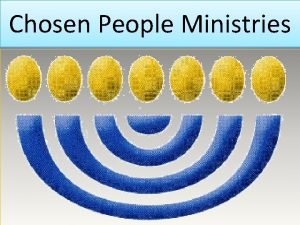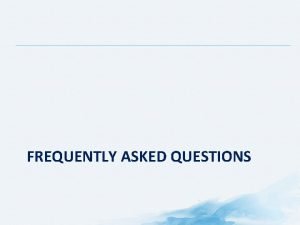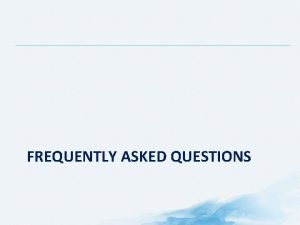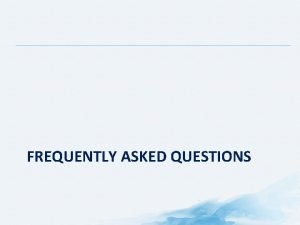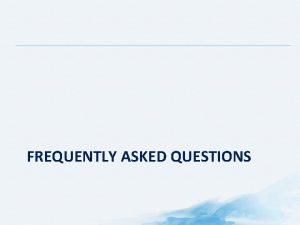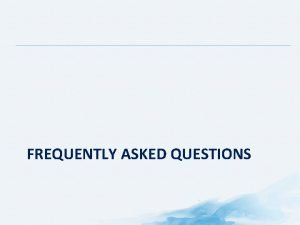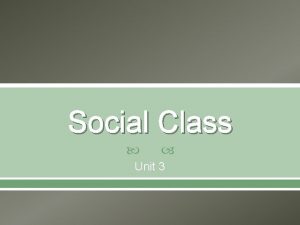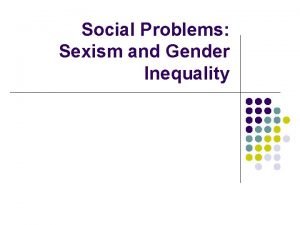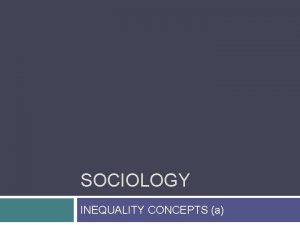SOCIAL INEQUALITY Social inequality exists when people frequently

































- Slides: 33


SOCIAL INEQUALITY • “Social inequality exists when people frequently receive more of a society’s ‘valuable goods’ than others owing to their position in the social network of relationships. ” (Hradil 2001. ) • 4 BASIC DIMENSIONS material wealth, power, prestige, education • 4 NEW DIMENSIONS working conditions, housing, environmental and leisure conditions

OVERVIEW • LIBRARIES ARE ACCESS, READING, EDUCATION, INFORMATION, KNOWLEDGE, LIFELONG LEARNING, IMPACT, LITERACY, LEISURE TIME, INCLUSION, CULTURE, MULTICULTURE, CREATIVITY, IMAGINATON, IDEAS…. . THE WAY FORWARD. . OPEN TO ALL?

. . YES to. . • all members of the community regardless of their race, nationality, age, sex, religion, language, disability, economic, work status and education… (IFLA Public Library Service Guidelines)

WELL. . • Libraries are open to all… BUT, not everybody come to libraries „Those who use the libraries are more likely to make use of many sources of information, of which the public library is just one. Those who do not use libraries use fewer other sources of information as well. ” (Rainie, Estabrook, Witt 2007. )

DO WE KNOW WHO ARE REAL USERS OF PUBLIC LIBRARIES? • • • College degree? Highschool degree? Young adults and children? Workpeople? Unemployed? Unqualified? Bohemians? Desperate housewives? Homeless? ( …)

RESEARCH PROJECTS • Research project Public Library Policy and Social Exclusion (Leeds Metropolitan University in partnership with the London Borough of Merton (Libraries), Sheffield Libraries, Archives and Information and John Vincent) (2000. ) • Pew Internet & American Life Project and University of Illinois Libraries Survey (2007. ) • Inter. Connections: the IMLS National Study on the use of Libraries, Museums and Internet: Public library report (2008. ) LACK OF RECENT RESEARCH AND RESEARCH IN EUROPE

Research project Public Library Policy and Social Exclusion (Leeds Metropolitan University in partnership with the London Borough of Merton (Libraries), Sheffield Libraries, Archives and Information and John Vincent) (2000. ) • PUBLIC LIBRARIES • serve a disproportionately high number of middleclass people, whilst working-class people use libraries very irregularly • children from wealthy homes use libraries and borrow library books far more frequently than do their poorer peers • often abandoned their role in provision of services for working class and “disadvantaged” communities • often failing excluded people

Pew Internet & American Life Project and University of Illinois Libraries Survey (2007. )

Almost seven in ten Americans (69%) say that public libraries are important to them and their family: 38% of Americans ages 16 and older say that the public library is “very important, ” and 31% say it is “somewhat important. ” Some 17% say it is “not too important, ” while 13% say it is “not important at all. ”

Institution of Museum and Library Services (IMLS) (2008. ) College degree 85, 9% Highschool degree 44% Young adults and children 40% Workpeople 60% Unemployed 55, 8 % Unqualified 39%

Excluded Social Group Bohemians ? Homeless ? Housebound people ? Prisioner and famillies ? Racial and ethnic minorities ? Refugees ? Travellers ?

WE NEED TO KNOW… • • • Who are our users? Who are our non-users? Who are excluded social group? Who wants to go to the library? Who has the fear of the library? Who thinks that library is only for educated people? . . WE NEED TO RESEARCH *THOUGHT FOR FUTURE* In order to overcome the principle of complete openness and use of library services, users of the library should be everybody, regardless of possession of a membership card.

SOCIAL INEQUALITY AND THE PUBLIC LIBRARY MANAGEMENT: RESEARCH AIM Discover potential social inequality segments in public library management. PURPOSE Signalize the problem of social inequality and indicate possible ways to prevent future development of social inequality in libraries. RESEARCH QUESTIONS 1. In which segments of public library management system social inequality can be identified? 2. Which are the ways to prevent the future development of social inequality that is found in the parts of public library management? METHODOLOGY Analysis of documentation of national strategies (for public libraries) SAMPLE Croatia, England, and Finland

DOCUMENTATION CROATIA Croatian Librarianship Strategy 2016 -2020 (Proposal) Strategy for Public Libraries 2013 -2015 (Proposal) ENGLAND Libraries Deliver: Ambition for Public Libraries in England 20162021 FINLAND The Way Forward for Public Libraries 2016 -2020


ENGLAND 36% USERS ARE ADULTS IN UPPER SOCIO-ECONOMIC GROUP 32% USERS ARE ADULTS WITH LIMITING DISABILITY 74% OF PEOPLE IN ENGLAND THINK THAT LIBRARIES ARE AN ESSENTIAL SERVICE TO THE COMMUNITY FINLAND 90% OF THE GENERAL PUBLIC (USERS AND NON-USERS) FELT LIBRARIES WERE EITHER VERY EFFECTIVE AT MEETING THE NEEDS OF THEIR LOCAL COMMUNITY 88% OF ADULTS LIBRARY MEMBERS AGED 25 -64 HAVE COMPLETED UPPER SECONDARY EDUCATION 58% OF LIBRARY MEMBERS ARE OVER 65

Potential social inequality segments • SOCIAL INCLUSION – potential library users and non-users – free use • FINANCING • SOCIAL ENGAGEMENT AND COOPERATION • DIGITAL INEQUALITY

SOCIAL INCLUSION • potential library users and non-users • proportion of services that are provided without charge Is there enough concern about attracting nonusers, or libraries are predominantly focused on existing ones?

• CROATIA – Social inclusion and equality are not explicitly emphasized but are involved • ENGLAND – “Libraries can have a critical role in helping people to realize their potential, and especially those from disadvantaged backgrounds. ” • FINLAND – Equality as one of the five values on which the strategy is based

THE WAY FORWARD • „Everyone has the rights and skills to use information resources“ • „Everyone has the right to participate and influence the society and living environment“ • „Everyone has the opportunity to visit library“ • „Everyone can access digital information and literature“ • „Library collections are easily found and combined with other information“

Potential users and non-users • Croatia – municipalities with no library access (238 in 2015) – functional network of libraries and services • England – some people can’t visit libraries or would prefer to use digital means (digital and outreach provision) • Finland – citizen library user

Free use • Croatia – improving free access to information sources and services (by 2020) • England – lending books and other printed material free of charge for those who live, work or study in the area • Finland – While promoting equality, the library is free of charge for everybody

FINANCING • excessive dependence on the founders or the local authorities (often the main financiers of the public libraries) • inequality in available funds among different libraries

• Croatia – the founders should be more legally bounded to fulfill their obligations • England – Funding library services in varied and sustainable ways (diversify funding by generating additional income streams) – public service mutual model • Finland – Transparency: „Using tax funds responsibly”

SOCIAL ENGAGEMENT AND COOPERATION Library as an active agent in the community • Innovation (different ways of approaching the same problem or impact they want to achieve)

• Croatia – Cooperation through functional national system • England – partnerships with formal learning organisations, local economic development organisations, other government and partner services • Finland – Library for citizens ; Sence of community as value – Planning services, space, cooperation with business

DIGITAL INEQUALITY • Informatization and ever-shifting information and communication technologies: greater access and use growing digital divide

• Croatia – Development of library services in digital surroundings • England – improved digital access and skills • Finland – Supporting media skills – Everyone can access digital information and literature – Library domesticates technology to be part of customer service

FOCUS ON… • • CROATIA Libraries > users ENGLAND Modifications in library management FINLAND Citizens Goals as aspects of contemporary library

SWOT ANALYSIS STRENGHTS LIBRARY MISION VISIBILITY AND VISION AWARNESS SERVICES WEAKNESSES LACK OF RESEARCH FOCUS ON EXSISTING USERS EQUAL PARTNER FINANCING OPPORTUNITIES SOCIAL ENGAGEMENT PROMOTION OF TECHNOLOGY EQUALITY THREATS FAST CHANGING EXCLUDED PHYSICAL COMPETENCSES SOCIAL GROUP ACCESS UNFAMILIARITY WITH DIFFERENT PROFILES OF POTENTIAL USERS FREE OF CHARGE

IN GENERAL • SOCIAL INEQUALITY EXSISTS IN LIBRARY ENVIRONMENT TWO MAIN PREVENTION ADVICE CONDUCT MORE RESEARCH THINK ABOUT POTENTIAL USERS STRATEGIES HAVE TO RESPOND ON THE NEEDS OF OUR LIBRARY COMMUNITIES

 Lesson 1-6 compound inequalities
Lesson 1-6 compound inequalities Social stratification vs social inequality
Social stratification vs social inequality How to answer how often
How to answer how often Online page fault calculator
Online page fault calculator Habitual action in simple present tense
Habitual action in simple present tense Usually always never often sometimes
Usually always never often sometimes Giles corey crucible
Giles corey crucible Www.kent.k12.wa.us frequently used links
Www.kent.k12.wa.us frequently used links Restate and paraphrase
Restate and paraphrase Hipaa frequently asked questions
Hipaa frequently asked questions Create table if not exists mysql
Create table if not exists mysql A digilocker account already exists
A digilocker account already exists Estimate each one-sided or two-sided limit, if it exists.
Estimate each one-sided or two-sided limit, if it exists. Deficit spending exists when
Deficit spending exists when When does limit exist
When does limit exist How to tell if limit exists
How to tell if limit exists A correlation exists when
A correlation exists when Activity 26.5 specialization and trade answers
Activity 26.5 specialization and trade answers Friction
Friction Attribute visibility from a to b exists when
Attribute visibility from a to b exists when Numbers neither prime nor composite
Numbers neither prime nor composite Gorgias nothing exists
Gorgias nothing exists Uml structural diagrams
Uml structural diagrams Elastic demand exists when
Elastic demand exists when Database table names singular or plural
Database table names singular or plural Determine whether a quadratic model exists
Determine whether a quadratic model exists A correlation exists when
A correlation exists when People as media definition
People as media definition Black eyed peas where is the love lyrics
Black eyed peas where is the love lyrics Recovery community
Recovery community Justpeople
Justpeople Social stratification in sociology
Social stratification in sociology Inequality social class
Inequality social class Functionalism social inequality
Functionalism social inequality

